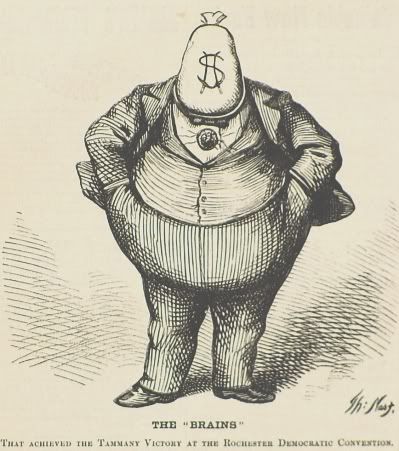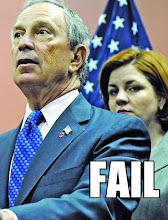Mayor Bloomberg and Deputy Mayor Goldsmith want to unwind the improvements in checks and balances that were instituted in response to the political corruption during the Tammany Hall era.
At a July 20, 2010 breakfast meeting, Stephen Goldsmith, the new Deputy Mayor of New York City, was compared to Jane Jacobs for the way he applied ''urban renewal'' to Indianapolis. (Meanwhile, Ms. Jacobs fought ''urban renewal'' when Robert Moses tried to ''apply'' it to Greenwich Village, but accepting the comparison to Mr. Goldsmith would have meant we were talking about historical facts, which doesn't seem to ''apply'' to what Mr. Goldsmith has learned about New York City's history.) Now that he is in New York City, Mr. Goldsmith has joined forces with Mayor Michael Bloomberg to transform New York City.
In the presence of political reporters Erik Engquist and Michael Scotto, the new deputy mayor described his political beliefs, which serve to underpin his worldview and approach to government.
Mr. Goldsmith said that a progressive form of government developed after the political corruptions scandals associated with Tammany Hall, and Mr. Goldsmith credited progressive reforms with professionalising the way that cities work. He said that we don't hire ''buddies'' anymore. Neither do we award government contracts in ways that would be questioned, he said. (Again, whether the hiring of, and awarding contracts to, ''buddies'' no longer happens is a matter of historical fact, and we'll let you decide the truth.)
But now, Mr. Goldsmith said, all the rules that made government free of corruption have worked to make government more complex. He cited as an example that all these rules have created a lack of authority in the city, and the city needs to get rid of the requirement of having to need permission from another level of bureaucrats before anything could be done if city officials hope to bring efficiency to the way the city government could be run. He seemed to say that he believed that the rule-based system needed to be changed, so that city employees could be ''liberated,'' and that this would result in civil workers being able to be creative while also being held accountable.
The way that he sees things, Mr. Goldsmith said, public service used to attract people, who were interested in helping the public. Instead, he said, public service is now only about enforcing the rules.
To Mr. Goldsmith, rules may be problematic to the kinds of changes he envisions bringing to New York City government, but rules have a reason for being : they are needed, because people are apt to have lapses in integrity. Anytime that politicians have an opportunity to privitise government services, there is a temptation to award government contracts to their well-connected friends or political allies.
The model of how he privatised government services while he was mayor of Indianapolis would be difficult to do here, in New York City, because he believes that the progressive rules in New York City give no discretion to the city's workers.
According to Wikipedia, ''Keeping corruption out of politics was a main goal of the progressive era, with many Progressives trying to expose and undercut political machines and bosses.''
To be fair to Mr. Goldsmith, his opinions about reforming the rules that govern city employees extend to ''unlocking'' the potential of the existing city workforce. He said he believes that progressive era rules were set because one could not trust the discretion (or judgment) of government employees. But once you begin to give higher level government employees discretion, one very quickly creates a situation, where political leaders begin to misuse that discretion. Political bosses are often associated with dishonesty, self-dealing, conflicts of interest, profiteering from government, and other forms of corruption.
Take, for example, the way that Mayor Bloomberg came to win a th3rd t3rm as mayor.
Before the end of his second, and what should have been his final, term in office, Mayor Bloomberg advocated for an extension of term limits, which would have resulted in the possibility that he could have run for a th3rd t3rm as mayor. With help from the City Council and a secret deal with Ronald Lauder, Mayor Bloomberg won the change in term limits through a vote by the City Council instead of through a voter referendum. (The New York Times even reported at the time that the mayor was ''pressing many of the community, arts and neighborhood groups that rely on his private donations to make the case for his third term,'' and the newspaper of record has just reported that at least one of those charity organisations, the Doe Fund, received millions of private monies for, what amounts to, its support for changing the term limits law.) What the mayor did was rely on the discretion of the City Council to change the law governing term limits, and, in a clear case of a conflict of interest, he urged the charities, which have depended on his private donations and government contracts, to support the controversial change in term limits law. Last year, Mayor Bloomberg was elected to a th3rd t3rm ; it was reported that he had spent approximately $109 million only to win by an unexpectedly slim margin of less than 5 per cent. Meanwhile, nobody knows whether electioneering payments amounting to $1.2 million that were made from the mayor's personal accounts to the Independence Party were intentionally not made from the mayor's campaign account in order to circumvent campaign disclosure requirements.
To get the new kind of ''better, faster, cheaper'' governance structure that the mayor wants, for example, the CityPragmatist blog has reported that there is a current movement by the 2010 Charter Revision Commission to, among other things, increase the mayor's discretion over city agency reports. If we had a City Council that could collectively do an honest thing, then the increase of the mayor's discretion would come at the cost of City Council's ability to review and ''extend or enhance'' any city agency report. But the reality is that right now, we have a City Council that has compromised its own integrity, because it is currently involved in a scandal over the disposition of discretionary slush funds.
Research and history published on Wikipedia indicate that some of the reforms of the progressive era brought more transparency to government. ''Progressives moved to enable the citizenry to rule more directly and circumvent political bosses ; California, Wisconsin, and Oregon took the lead. California governor Hiram Johnson established the initiative, referendum, and recall, viewing them as good influences for citizen participation ....''
What were the motives of City Council members,
who supported Mayor Bloomberg's extension of
term limits ?
Artist and social media commentator Suzannah B. Troy was also present to witness Mr. Goldsmith's speech at his July 20, 2010 breakfast meeting. She has described the vote by City Council to allow an extension of term limits a conflict of interest, because the same extension of terms limits was self-serving : it allowed many council members to run for, and win, a th3rd t3rm, including Council Speaker Christine Quinn. Ms. Troy has criticised the mayor for denying voters a referendum on the change in term limits.
Two months after the questionable City Council vote to extend term limits, a judge affirmed the mayor's tactic, The New York Times reported. (It was in the 1990's when terms limits had originally come into being in New York City after having twice been approved by, ironically, voter referenda.) We are now so far removed from progressive sensibilities that not even judges appreciate or respect voter referenda that are concerned with checking the power on politicians (in other words, to prevent the rise of political bosses). Going back to the history about past political corruption in New York City, the term ''Tammany Hall'' is "used to refer to a corrupt system of buying or controlling votes." Wrestling away from voters the control over term limits is precisely what the mayor, City Council, and now the judicial system have done. Surely, all these signs indicate that we are returning to a modern-day ''Tammany Hall'' era.
And based on the mayor's use of his private donations to charities, we are witnessing the very revival of political patronage : expecting, receiving, and rewarding groups for their electoral support. Add to that the fact that Mayor Bloomberg makes large and questionable electioneering payments from his personal accounts to political parties, and you have a situation that is rife with potential abuses.
Respected political reporter Gabe Pressman has described how the influence of money can corrupt politics.
"Abraham Lincoln spoke at Gettysburg of his ideal of a government of the people, by the people and for the people. He didn’t mean government of the fat cats and by the fat cats. With all due respect to the feline family -- and I happen to love cats -- Lincoln was an apostle of democracy in a purer sense. ¶ The machinations of millionaires and billionaires are foreign to what he believed. The lack of strict laws governing campaign expenditures continues to be a disgrace to our country."
Meanwhile, in a recent blog post on The New York Times, somebody commented, "How many times do we have to vote for term limits before they become permanent law ?" While we may still think that history shows us that we can count on established legal precedents and codified progressive reforms for how our votes get counted and how our government works, Mayor Bloomberg and Deputy Mayor Goldsmith believe otherwise. And it is their twisted and warped sets of beliefs, which are not based on facts, that seem to carry the day.



.gif)

No comments:
Post a Comment
'' The more you attune yourself from your centre to the centre in everything, the more you will find that there is a sympathetic interrelationship in the universe that enables perfect understanding of all things. '' ~ Swami Kriyananda